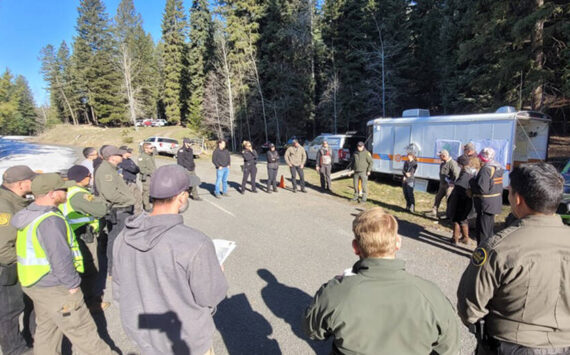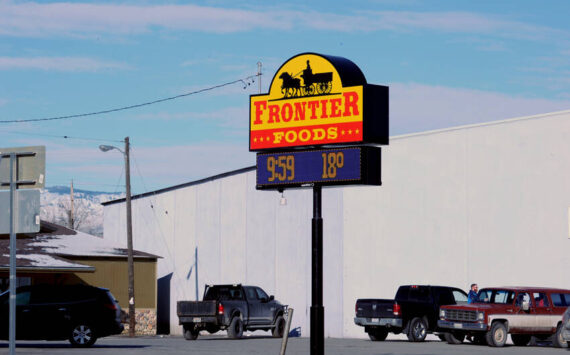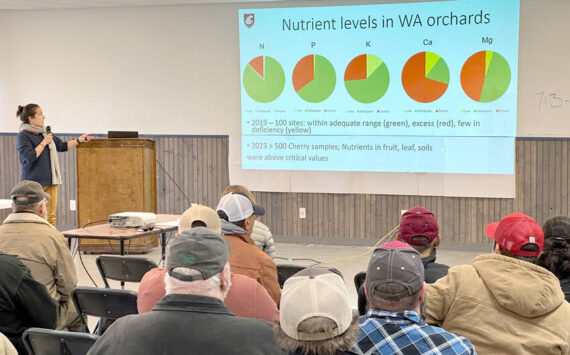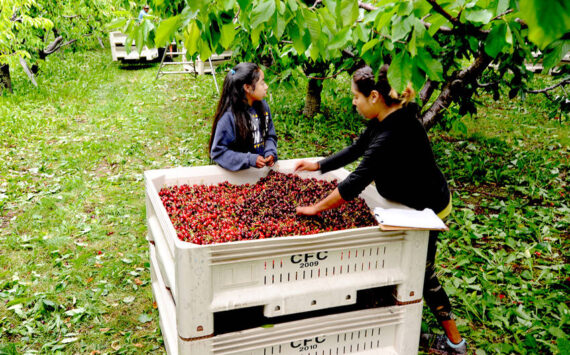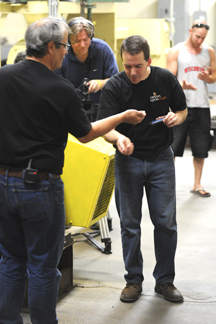
Ryan Skinner, Vice President of Carbon Cycle Crush tastes some of the canola meal produced at the demonstration held at the company’s Oroville plant. The meal is highly desired by dairy farmers and poultry farmers for its high C3 Amino Acid content that i
OROVILLE – The Carbon Cycle Crush team demonstrated the mills they will soon begin using to crush 100 tons of canola seed a day into oil and meal in the very near future.
The oils can be used for a variety of products including lubricants and Green Diesel, while the meal is highly prized by dairy and cattle farmers, as well as poultry farmers. Farmers have found the high-protein meal is a good source of C3 Amino Acids which are passed on to the milk and eggs produced by animals that eat it, according to Tim King, President of Carbon Cycle Crush.
“Green diesel is like Biodiesel only we can’t call it that because the soybean industry has patented that name,” said King.
The demonstration took place last Saturday at CCC plant on Appleway and Cherry at former apple packing and warehouse facilities the company is purchasing from Gold Digger Apples. Among those attending the invitation-only demonstration were Okanogan County Commissioners Jim Detro and Andy Lampe.
The event started with a few words from Ryan Skinner, Vice President of Carbon Cycle Crush. He described the facility as a work in progress that is nearing its goal of beginning production. Skinner introduced King who talked about his background working for the USDA as an agronomist. He said he first started thinking about Canola from Canada 30 years ago. Six years ago he bought the milling equipment from a mill in Lethbridge, BC.
He said Oroville was a good place to begin their venture because of its proximity to the Canadian border, the fact that there was a railhead and a heavy haul corridor on Highway 97 and the availability of buildings like the ones the company was purchasing.
“I have the equipment and the knowledge, we had a community that was supportive and county commissioners that were supportive,” said King. “This belongs to the community.”
King said that although there were tax incentives out there and areas that are offering tax breaks, he wanted to start production without taking advantage of these.
“My idea is you can’t come into a community and not pay your fair share,” he said.
King then led the group into a covered bay where trucks can unload their seeds — the company expects two trucks capable of hauling 50 tons of canola seeds to unload at the plant every day, 365 days a year. He said the two mills that are about to begin operation can crush 100 tons of seeds a day yielding 100 gallons of oil per ton.
The two Chinese-made mills were then demonstrated — buckets of canola were poured in through the side by Ed Gooldy, plant manager. King offered Skinner, who says he likes the taste, some of the resulting meal. Others were invited to taste it.
The final piece of the puzzle before they can begin full operation is to install a boiler that will heat the seeds up to about 200 degrees Fahrenheit. This will allow the oil to be more easily extracted from the seeds. King said that his company has located a boiler in Illinois that can be run on oils such as they can get from canola and camellia seeds. He said the electricity to run the boiler would cost about $2000 a month, much less than the $60,000 to $90,000 a month being spent on natural gas or propane to run boilers at other operations. He explained that the company was just going to heat the seeds up, not boil them. Heated oil will be circulated around the outside of the green hoppers above each of the mills.
Other operations literally cook the seeds and then use petrochemicals to extract every ounce of oil from the seeds, according to King. He said CCC’s operation wants to leave more oil behind to make the meal they will sell to farmers even more desirable. He said they would not be using chemicals to extract the oil.
Another difference, according to King, is that the company will use greener, less expensive seeds since they don’t plan at this point to create food-grade oil for human consumption. He said the oil will be darker in color, but just as good as the oil produced by food industry, if not better, because CCC will not be bleaching their oil like the companies that sell the oil for human consumption do.
Next King led the group to the company’s football-field size room. In that room are several large capacity presses that King bought from Lethbridge. He said he plans on using these in an area where lots of Canola is grown. The room will be used as a training center where the company will set up an entire plant, using the Oroville plant as a template. Then operators will be trained and eventually the new plant will be packed up and moved to another location with a ready trained crew to operate it. King said the company has six other locations in the state in mind. He also said there has been a lot of interest in building plants and training personnel for communities in Alberta, where much of the canola, Canada’s number one crop, is grown.
After the demonstrations many of those invited travelled to Esther Bricques Winery, owned by Steve and Linda Colvin, for food and wine. The local band North Half also performed.



